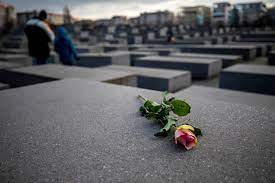Next, an editorial reflecting the views of the United States government. In January, we remember one of the darkest events in the history of humanity—the Holocaust, the systematic elimination of the Jewish people by Nazi Germany and its collaborators. Although there is understanding that the Holocaust coincided with the years of the Second World War, its origins began earlier. In truth, the beginnings of the Holocaust go back to the 1930s, when the Nazi Party came to power and the German government began to target those they deemed to be inherently inferior. Such people, mostly civilians, were rounded up, shut into ghettos, and deported to dozens of concentration or slave labor camps. Many people were shot and dumped into mass graves. By late 1941, a number of camps began the process of murder on a massive scale. Then, on January 20, 1942, at the so-called Wannsee Conference, Nazi leadership decided to formalize the implementation of the “Final Solution”: the systematic annihilation of a specific segment of the population as government policy: an atrocity perpetrated against the Jewish population.

It was a part of the Second World War, yet it was separate from the German war effort. Indeed, the Final Solution often took precedence over the war effort: despite a desperate need for personnel and material on the front lines, no assets or supplies were diverted from death camp assignments. In the end, the “Final Solution” resulted in the deaths of six million Jews. Never before on such a scale in human history had genocide—the annihilation of an entire people--been implemented as government policy. International Holocaust Remembrance is a time to remember the people murdered in the Holocaust, not only to honor the dead but also to remind ourselves what unspeakable horrors humans are capable of perpetrating. “Never again,” humanity said as the United Nations General Assembly adopted the 1948 Convention on the Prevention and Punishment of the Crime of Genocide. Yet in January, we also remember the victims of the genocides which followed in Cambodia, Rwanda, Bosnia, and Darfur. As the Spanish philosopher George Santayana once wrote, “Those who cannot remember the past are condemned to repeat it.” That was an editorial reflecting the views of the United States government.
VOA译文由可可原创,未经许可请勿转载。













